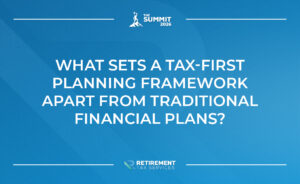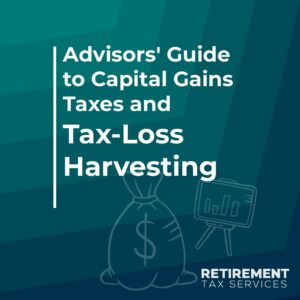Background
Get tax returns for all of your clients. This is one of the most common themes you will see on this website and in our podcast. Tax mistakes do happen.
It goes beyond a recommendation. It is a belief: To be a truly great advisor, you absolutely have to be reviewing tax returns. The goal is not to replace tax professionals. On the contrary, make sure you are responsibly approaching retirement tax planning.
Really understanding a client’s tax situation is the only way you can be sure that your recommendations are in their best interest. However, when we say “Get every client tax return”, we don’t just mean “Look at their Form 1040.”
In other words, ask your client to send you every last page of the return. This includes all the supporting schedules and forms. In fact, there are all sorts of details you cannot find just looking at the 2 pages of the 1040.
3 Reasons Why Reviews Are Vital
Look at every client’s tax return. Next, commit these to memory. For retirement planning, there are 3 key reasons why it’s important: Identifying tax planning opportunities for the future, verifying tax planning strategies were reported correctly, and the absence of anyone having explained reading tax returns to the client. Learn them. It’s a value-add.
1) Identifying tax planning opportunities for the future. What better way to narrow down tax planning opportunities for a particular client (or prospect) than looking at their tax return? With this in mind, see what types of income they do or do not currently have. Rather than having an expansive checklist or exhaustive questionnaire, look at their return with them. As a result, you will immediately be able to narrow your focus to what might add value.
2) Verifying that tax planning strategies were reported correctly to the IRS. This can easily go wrong even for the most seasoned advisors. That is to say, keep alert for tax mistakes. Make sure qualified charitable distributions get reported to the IRS. Otherwise, it may as well not have happened. Do your homework. Short of actually preparing client’s taxes, there is no other way to guarantee that transactions end up on the return as you planned them.
Ask yourself…
What if the client forgets to tell the tax preparer or gives the wrong information?
Consequently, what if you send the tax preparer a detailed letter explaining what you did with the client during the year—and a data entry error is made, anyway?
What if you prepare the return and make a data entry error?
These things all happen. It’s vital to catch mistakes before they end up having to amend a return. As a result, I know an advisor who asks his clients to send drafts of the tax return before they are filed. Get positively proactive.
3) No one has ever explained reading tax returns to the client. In fact, to some clients, all those numbers appearing on their return is almost magical. Walk them through their return. Take the chance to help educate them. This, alone, saves you so much time in the future when discussing tax-free income, capital gains, et cetera. Additionally, this shows your expertise on the tax return. It puts you, as their advisor, in the role of the trusted tax expert.
Tax Mistakes To Look For
So, with those overarching themes, let’s go through 5 things that every advisor (or their team) should review on clients’ 2020 tax returns:
1. Personal Identifiable Information. You should have your client’s personal information in your CRM. So, make sure it ended up on their tax return correctly. I had an advisor recently tell me a story about a client getting a nasty-gram from the IRS. Accordingly, that was scary and confusing. However, it was sent because their social security number was wrong. Your team can handle this. Inform your client that you’ve taken care of it for them. Do this whether you find an error or not.
2. Tax treatment of any transactions you worked with the client on during the year. Tax mistakes happen. Thus you make them, the custodian makes them, and the tax preparer makes them. Check often. Ultimately, the client is the one cutting the check to Aunt IRS. The most extreme case I know of involved a client’s IRA rollover being incorrectly marked as a taxable distribution. An amended return was filed: the client paid tax on a several-hundred-thousand-dollar rollover.
3. Form 8606. Make sure it was filed correctly. Check twice if you are working with a client on backdoor Roth contributions. You’re not aware of any reason they should have a Form 8606? Look for it anyway. Clients often end up with non-deductible IRA contributions they didn’t intend.
Pro Tip: if a client or prospect has a Form 8606 you weren’t expecting, try saying “I see that you have non-deductible IRA contributions on Form 8606. What is your strategy for having tax-free money in retirement?”
This is a great way to bring it to their attention. At the same time, it avoids assuming they don’t know what’s in their return.
Second Pro Tip: Ask if they have ever made IRA contributions. Always. Just because their 8606 isn’t on the return doesn’t mean they shouldn’t have one. Next, go back and look to see if those were deductible contributions. We have found hundreds of thousands of dollars that were missed on this. Remember that if there is no 8606, it all comes out taxable!
4. Charitable Contributions. With the standard deduction so high, many taxpayers do not itemize. However, this can be a great way to identify if a client is charitably-inclined. Don’t miss it. There are several opportunities around charitable giving. However, they only make sense to recommend to charitably-inclined clients. No amount of savings can make giving worthwhile if you weren’t already planning to do it.
5. Form 8915-E. This is the 2020 version of Form 8915, which covers Qualified Disaster Retirement Distributions. We have an entire article dedicated to this topic. Nonetheless, the short version is the IRS added COVID-19 to their list of qualified disasters. Everyone in the US could potentially claim this for 2020. Make sure you know whether or not their tax preparer filed this form (particularly if the client had taxable distributions in 2020): It spreads tax liability on that distribution over 3 years. That could have significant impacts on planning opportunities in 2021 and 2022.
Take Action To Prevent Tax Mistakes
Here is what every great advisor should be doing related to this topic:
- Get tax returns for every client every year! In fact, read this article again if you aren’t sure why. Tax mistakes will happen. Expect them.
- Create a system for obtaining and reviewing client tax returns. In other words, incorporate it into your processes and delegate as much as you can. Make the choice to commit. That’s only way for this to be effective and sustainable.
- Find someone who reviews more tax returns than you and learn from them. This can be another advisor. However, if you want to go next-level, meet with your clients’ CPAs. Or, find ones that you would like to have in your network and learn from them.
- Find a tax preparer you can strategically partner with for your clients’ tax needs. Indeed, the more you proactively work with tax professionals, the more value you will add to your clients.
Great advisors provide value in all aspects of their clients’ financial lives. CPAs do not have exclusive rights on all things tax-related. In fact, many of them will thank you for taking these steps with your shared clients.
Even if you find yourself in a situation beyond your expertise, you can still serve your client and provide value: Partner with them to work with the tax expert. Don’t just sit back and say, “Sorry, I don’t give tax advice.”
Good luck out there and remember: Tip your server, not the IRS.





